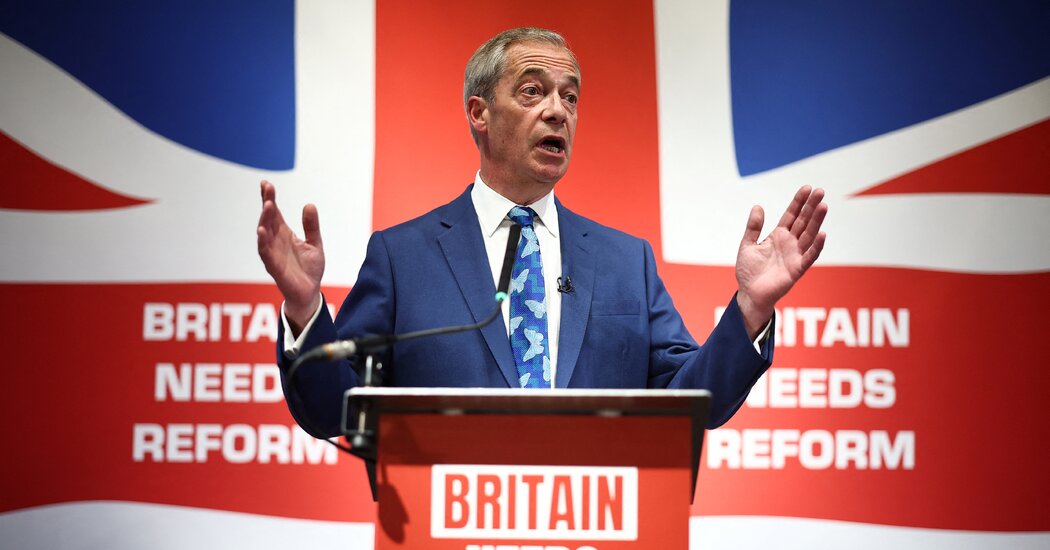Nigel Farage, the pro-Brexit activist and serial disruptor of British politics, announced plans on Monday to stand in Britain's general election next month, dealing a fresh setback to the prospects of the country's embattled prime minister, Rishi Sunak.
The surprise announcement by Farage, who represents a far-right rebel movement fighting to curb immigration, threatens to upend the campaign by taking votes away from Britain's ruling Conservative Party. In doing so, it could make it even more difficult for Sunak and his party to narrow the double-digit gap in the polls with the opposition Labor Party.
Divisive, charismatic and famous for his communication skills, Farage was one of the architects of Brexit, which a narrow majority of Britons supported in a 2016 referendum. Some analysts believe that Farage's previous decision not to run this year has weakened the momentum of his party, Reform UK, the successor to the Brexit Party he once led.
Last month Farage said he would not seek a parliamentary seat because he wanted to prioritize supporting Donald J. Trump's election campaign in the United States. Farage is a longtime ally of the former president and campaigned for him in 2016 and 2020.
But on Monday Farage reversed his decision, saying he would take charge of Reform UK for the next five years and stand for a seat in Parliament.
“I've changed my mind: It's allowed, you know,” he said. “I will stand in this election.” She added that he will run in Clacton, a seaside area where support for Brexit has been strong.
The announcement comes on the eve of one of the biggest events of the British election campaign so far: a televised debate on Tuesday evening between Sunak and Keir Starmer, the leader of the opposition Labor Party.
Sunak is already under considerable pressure, with his Conservative Party trailing in opinion polls and after a gaffe-prone start to the campaign.
Farage's change of heart could worsen the prime minister's prospects because, according to analysts, Reform UK risks taking away a significant number of votes from the Conservatives. Until now, much of Sunak's election strategy appears to have been directed at winning back potential supporters of Reform UK, motivating his core right-wing voters to vote and avoiding a major defeat.
But on Monday Farage said the Conservatives were destined to be swept away by a wave of contempt for the political establishment and were “on the brink of total collapse”.
Despite Farage's profile and popularity on the British political right, electoral success in Clacton, where he intends to stand, is not guaranteed. He has never been elected to the British Parliament at Westminster, despite seven previous attempts, although he was a member of the European Parliament for two decades before Britain left the European Union.
In Britain's winner-takes-all electoral system, candidates from smaller parties struggle as they must secure the largest share of votes in the area they seek to represent.
Nonetheless, Farage appears to have calculated that he has a chance of victory in Clacton, a staunchly pro-Brexit town about 80 miles northeast of London. He was once represented by an MP from the United Kingdom Independence Party, which was once also led by Farage and which campaigned for Britain's exit from the European Union.
With the Conservatives trailing in opinion polls, Farage has been increasingly outspoken in predicting a significant defeat for Sunak's party, even speculating that it could be on the scale of that suffered by Canada's Progressive Conservatives in 1993.
In an interview with London's Sunday Times over the weekend, Farage said he named his party Reform UK after the Canadian rebel party of the same name.
“It took time, it took two elections, they became the largest party in the centre-right. They then absorbed what was left of the Conservative Party and renamed it,” she said.
Asked whether he was suggesting a merger between Reform UK and the Conservatives, Farage replied: “More like a takeover, dear boy.”
Farage has admirers on the right of the Conservative Party, including Jacob Rees-Mogg, a former government minister who even called for Farage to be invited to stand as an MP for the Conservatives.
Since 2016, Farage has openly expressed his support for Trump and last week described the convictions against him for 34 crimes as a “disgrace”.
In the 2019 general election, the Brexit Party ran no candidates in many parliamentary constituencies. This was to help Boris Johnson, former leader of the Conservative Party, whose election promise was that he would “get Brexit done” and who achieved a major electoral victory.
But Richard Tice, leader of Reform UK until Farage replaced him on Monday, said that deal would not happen again and vowed to fight the Conservatives in England, Scotland and Wales.





